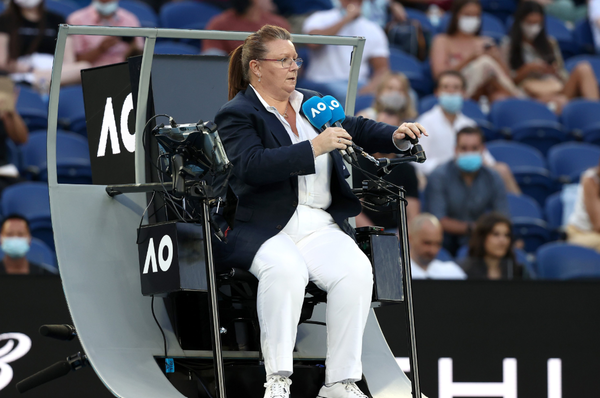
Imago
Credits: LTA/X

Imago
Credits: LTA/X
As tennis fans gear up for a thrilling Wimbledon 2025 final between Carlos Alcaraz and Jannik Sinner, all eyes aren’t just on the players—there’s also growing interest in the match’s officiating. Alison Hughes, one of the most respected names in international tennis umpiring, has been appointed as the chair umpire for this historic showdown on Centre Court. But who is she, and why has her selection taken the spotlight?
Watch What’s Trending Now!
Who Is Alison Hughes? A Gold Badge Chair Umpire Since 2003
Alison Hughes commands respect on court as an esteemed British tennis umpire, known for her cool, composed, and fair demeanor. Born in Newcastle Upon-Tyne, Hughes started officiating in junior matches in her home locality in 1991, and joined the Association of British Tennis Officials and LTA Officiating. In 1993, she made her first appearance at Wimbledon.
In 2003, Hughes was awarded a Gold Badge Chair Umpire certificate – the highest award in tennis officiating bestowed by the International Tennis Federation for mastery and discretion, as well as an uncompromising commitment to the integrity of the game. She has been a model for prospective umpires in terms of maintaining good communications, steady leadership abilities, and firmness even under pressure.
Alison Hughes’ Career Highlights and Experience Before Wimbledon 2025
Alison Hughes’ résumé is among the most impressive in tennis officiating:
- Grand Slam Finals: Hughes was named chair umpire for the 2004 Wimbledon Women’s singles final. Labelled as one of the biggest upsets in Wimbledon history, Hughes played her part in Maria Sharapova’s triumphant 6-1, 6-4 victory over Serena Williams. Till 2021 she umpired an extraordinary number of 22 Grand Slam singles finals, a record for any British official, highlighting her stature in the game.
- Olympic Games: She has officiated in four Olympic Games, including the women’s singles finals in Athens in 2004 and Beijing in 2008, as well as the men’s doubles final in Rio 2016.
- Historic Matches: On an important note, Hughes was only the second woman ever to umpire at the US Open men’s final in 2018 between Novak Djokovic and Juan Martín del Potro and thus joins the select class of female officials who have officiated men’s Grand Slam finals. She chair umpired her sixth Wimbledon Women’s singles final in 2015 as Serena Williams lifted her sixth of seven titles at SW19. Two years later she also officiated the last Grand Slam final between the Williams sisters at the Australian Open.
- Other Major Roles: She has umpired as many as 15 Billie Jean King Cup finals (formerly Fed Cup) and dozens of Davis Cup ties, showing her versatility and trusted services in men’s and women’s tennis alike.
In an interview with the Metro in 2019, Hughes said, “I sat in the umpire’s chair after the coin toss and realised that one of my biggest dreams had finally come true.” She further added, “I felt so proud to have been chosen for it and did my best to concentrate on not tripping over as I collected my medal from the Duke of Kent after the match.”
Final Thoughts
As Carlos Alcaraz and Jannik Sinner battle for the Wimbledon 2025 crown, all eyes will always be on Alison Hughes. With decades of experience, Gold Badge status, and the ability to steer through the sport’s most demanding occasions, she would be the ideal choice for this final. So, whether you’re rooting for the Spaniard or the Italian, there is no doubt that Centre Court remains in safe and experienced hands.
As the match progresses, viewers can rest assured that the players will determine the outcome, with Hughes on the sidelines to ensure clarity, control, and professionalism throughout.

